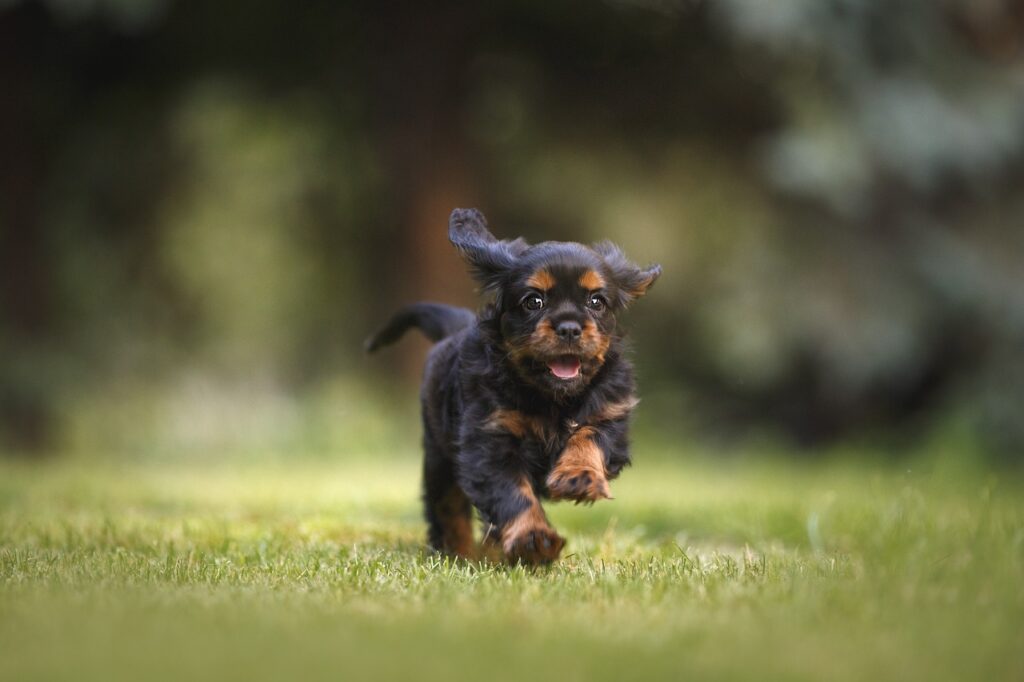Welcome to a condensed version of the book resource for raising a well-behaved and happy puppy.
In this brief article, you’ll learn the importance of early puppy training, as well as the most effective techniques and approaches to ensure your puppy grows into a confident, obedient, and loving companion.
Table of Contents
Understanding Puppy Development
Puppies go through various stages of development from birth to adulthood, each with its own set of milestones and learning opportunities.

It’s crucial to understand these stages to provide appropriate training and socialization.
Neonatal Period (0-2 weeks): Puppies are entirely dependent on their mother.
Transitional Period (2-4 weeks): Puppies begin to walk, see, and hear.
Socialization Period (4-14 weeks): Puppies are highly receptive to new experiences and learning.
Juvenile Period (14 weeks-6 months): Puppies enter adolescence, and behavior problems may emerge.
Adolescent Period (6 months-2 years): Puppies reach sexual maturity and require consistent training.
Choosing the Right Puppy
Consider the breed’s characteristics, size, energy level, and temperament when choosing a puppy. Visit reputable breeders or rescue organizations and observe the puppies’ behavior to select the best fit for your lifestyle.
Preparing for Your Puppy’s Arrival
Prepare your home by setting up a designated space for your puppy, including a crate for sleeping and a playpen for supervised playtime. Puppy-proof your home by removing hazards, such as electrical cords and toxic plants.
Establishing Routines and Schedules
Create consistent routines for feeding, exercise, and sleep to help your puppy feel secure and develop good habits. Puppies thrive on predictability and will be more comfortable in their new environment with a structured daily schedule.
House Training
Begin house training immediately by establishing a routine for taking your puppy outside to eliminate. Reward your puppy with praise and treats when they go to the bathroom in the designated area.
Be patient and consistent, and remember that accidents are a normal part of the learning process.
Socialization
Expose your puppy to various people, animals, and environments during their socialization period to prevent fear and aggression later in life. Use positive reinforcement to create positive associations with new experiences.
Basic Obedience Training
Teach your puppy essential commands, such as sit, down, stay, come, and heel, using positive reinforcement techniques. Consistency and timing are crucial for successful obedience training.
Leash Training
Introduce your puppy to a collar and leash, and gradually teach them to walk politely by your side. Reward your puppy for maintaining a loose leash and remaining calm in the presence of distractions.
Preventing Common Behavior Problems
Address issues like jumping up, nipping, excessive barking, and separation anxiety early on by redirecting inappropriate behaviors and reinforcing desirable ones.
Advanced Training Techniques
Explore clicker training, target training, and shaping to teach your puppy more advanced behaviors and tricks. These methods rely on positive reinforcement and help strengthen the bond between you and your dog.
Puppy Health and Nutrition
Provide your puppy with a balanced diet suitable for their age, breed, and activity level. Follow vaccination schedules and maintain regular grooming and dental care routines to ensure your puppy’s overall health and wellbeing.
Graduating to Canine Good Citizen (CGC) or Therapy Dog
Prepare your dog for the CGC or Therapy Dog tests by reinforcing obedience and socialization skills. These certifications demonstrate your dog’s good manners and can open doors to various opportunities, such as volunteer work in hospitals, schools, and nursing homes.
Conclusion
Training your puppy is a lifelong process that requires patience, consistency, and dedication.
By following the guidance provided in this article, you will foster a strong bond with your dog and enjoy a lifetime of companionship with a well-trained and happy canine friend.
Remember to keep learning and refining your training techniques as you and your puppy progress. The ongoing commitment to your dog’s education will ensure their continued growth and happiness, and strengthen the bond between you both.
You now have the tools and knowledge to successfully train your puppy and raise a confident, obedient, and loving canine companion.
Enjoy the journey, and cherish the special bond you create with your furry friend.


Dennis and Becca, have always shared a passion for man’s best friend. As dog enthusiasts, they put together articles that inform, engage, and captivate fellow dog lovers.